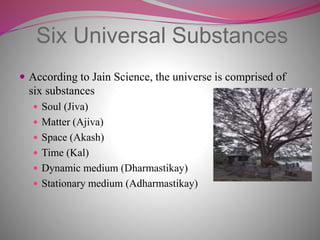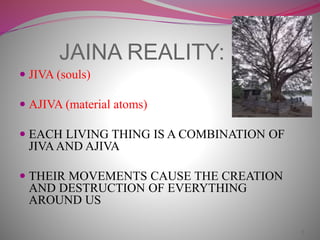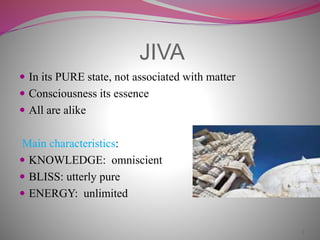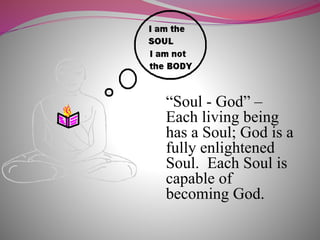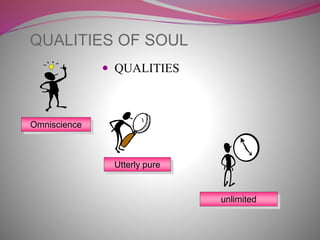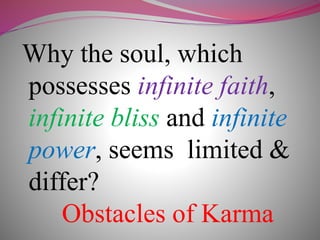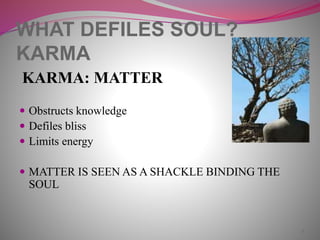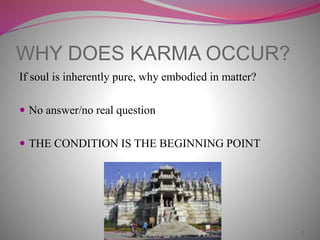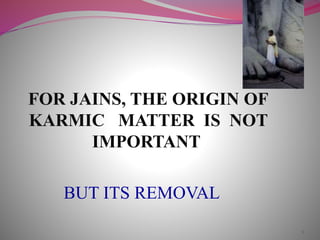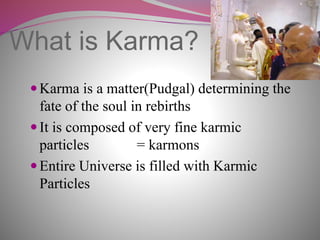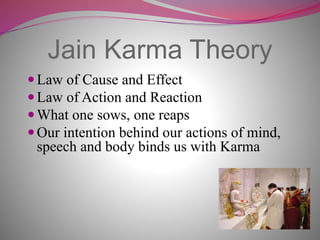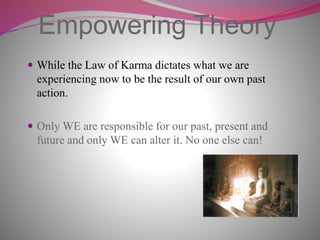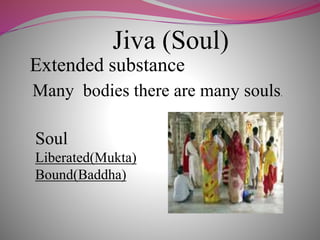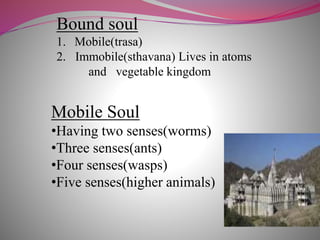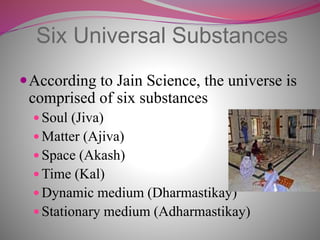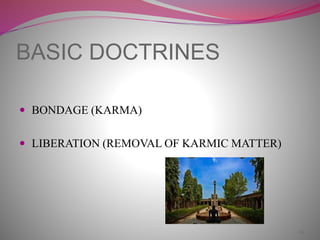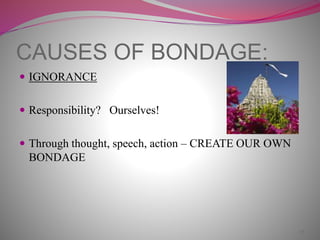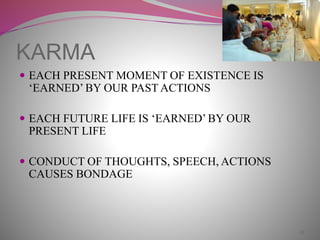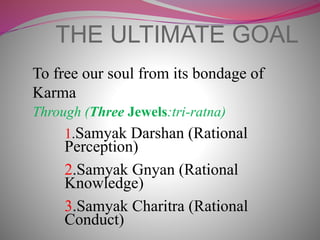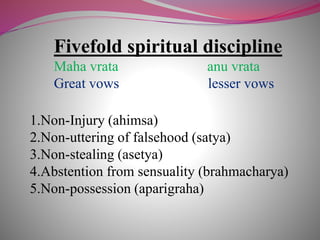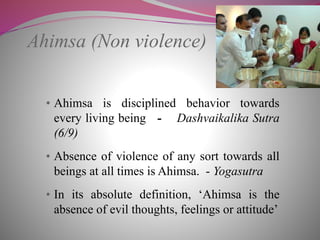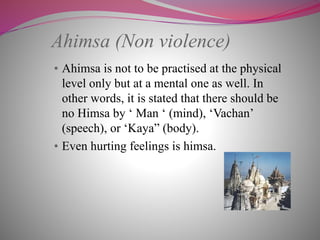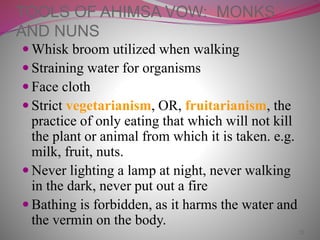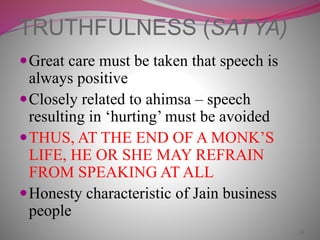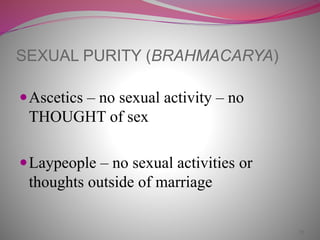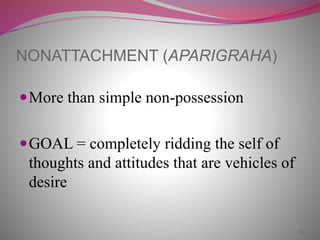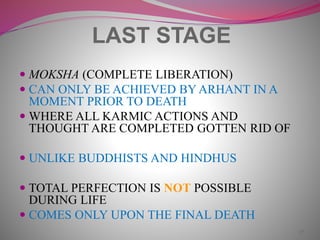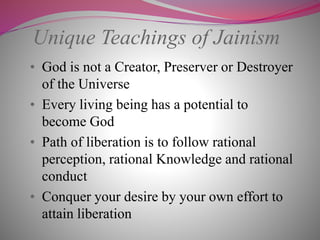Jainism 2
- 1. Six Universal Substances ï According to Jain Science, the universe is comprised of six substances ï Soul (Jiva) ï Matter (Ajiva) ï Space (Akash) ï Time (Kal) ï Dynamic medium (Dharmastikay) ï Stationary medium (Adharmastikay)
- 2. JAINA REALITY: ï JIVA (souls) ï AJIVA (material atoms) ï EACH LIVING THING IS A COMBINATION OF JIVAAND AJIVA ï THEIR MOVEMENTS CAUSE THE CREATION AND DESTRUCTION OF EVERYTHING AROUND US 2
- 3. JIVA ï In its PURE state, not associated with matter ï Consciousness its essence ï All are alike Main characteristics: ï KNOWLEDGE: omniscient ï BLISS: utterly pure ï ENERGY: unlimited 3
- 4. âSoul - Godâ â Each living being has a Soul; God is a fully enlightened Soul. Each Soul is capable of becoming God.
- 5. QUALITIES OF SOUL ï QUALITIES unlimited Utterly pure Omniscience
- 6. Why the soul, which possesses infinite faith, infinite bliss and infinite power, seems limited & differ? Obstacles of Karma
- 7. WHAT DEFILES SOUL? KARMA KARMA: MATTER ï Obstructs knowledge ï Defiles bliss ï Limits energy ï MATTER IS SEEN AS A SHACKLE BINDING THE SOUL 7
- 8. WHY DOES KARMA OCCUR? If soul is inherently pure, why embodied in matter? ï No answer/no real question ï THE CONDITION IS THE BEGINNING POINT 8
- 9. FOR JAINS, THE ORIGIN OF KARMIC MATTER IS NOT IMPORTANT BUT ITS REMOVAL 9
- 10. What is Karma? ïKarma is a matter(Pudgal) determining the fate of the soul in rebirths ïIt is composed of very fine karmic particles = karmons ïEntire Universe is filled with Karmic Particles
- 11. Jain Karma Theory ïLaw of Cause and Effect ïLaw of Action and Reaction ïWhat one sows, one reaps ïOur intention behind our actions of mind, speech and body binds us with Karma
- 12. Empowering Theory ï While the Law of Karma dictates what we are experiencing now to be the result of our own past action. ï Only WE are responsible for our past, present and future and only WE can alter it. No one else can!
- 13. Jiva (Soul) Extended substance Many bodies there are many souls. Soul Liberated(Mukta) Bound(Baddha)
- 14. Bound soul 1. Mobile(trasa) 2. Immobile(sthavana) Lives in atoms and vegetable kingdom Mobile Soul âĒHaving two senses(worms) âĒThree senses(ants) âĒFour senses(wasps) âĒFive senses(higher animals)
- 15. Six Universal Substances ïAccording to Jain Science, the universe is comprised of six substances ï Soul (Jiva) ï Matter (Ajiva) ï Space (Akash) ï Time (Kal) ï Dynamic medium (Dharmastikay) ï Stationary medium (Adharmastikay)
- 16. BASIC DOCTRINES ï BONDAGE (KARMA) ï LIBERATION (REMOVAL OF KARMIC MATTER) 16
- 17. CAUSES OF BONDAGE: ï IGNORANCE ï Responsibility? Ourselves! ï Through thought, speech, action â CREATE OUR OWN BONDAGE 17
- 18. KARMA ï EACH PRESENT MOMENT OF EXISTENCE IS âEARNEDâ BY OUR PAST ACTIONS ï EACH FUTURE LIFE IS âEARNEDâ BY OUR PRESENT LIFE ï CONDUCT OF THOUGHTS, SPEECH, ACTIONS CAUSES BONDAGE 18
- 19. THE ULTIMATE GOAL To free our soul from its bondage of Karma Through (Three Jewels:tri-ratna) 1.Samyak Darshan (Rational Perception) 2.Samyak Gnyan (Rational Knowledge) 3.Samyak Charitra (Rational Conduct)
- 20. Fivefold spiritual discipline Maha vrata anu vrata Great vows lesser vows 1.Non-Injury (ahimsa) 2.Non-uttering of falsehood (satya) 3.Non-stealing (asetya) 4.Abstention from sensuality (brahmacharya) 5.Non-possession (aparigraha)
- 21. Ahimsa (Non violence) âĒ Ahimsa is disciplined behavior towards every living being - Dashvaikalika Sutra (6/9) âĒ Absence of violence of any sort towards all beings at all times is Ahimsa. - Yogasutra âĒ In its absolute definition, âAhimsa is the absence of evil thoughts, feelings or attitudeâ
- 22. Ahimsa (Non violence) âĒ Ahimsa is not to be practised at the physical level only but at a mental one as well. In other words, it is stated that there should be no Himsa by â Man â (mind), âVachanâ (speech), or âKayaâ (body). âĒ Even hurting feelings is himsa.
- 23. 23 TOOLS OF AHIMSA VOW: MONKS AND NUNS ï Whisk broom utilized when walking ï Straining water for organisms ï Face cloth ï Strict vegetarianism, OR, fruitarianism, the practice of only eating that which will not kill the plant or animal from which it is taken. e.g. milk, fruit, nuts. ï Never lighting a lamp at night, never walking in the dark, never put out a fire ï Bathing is forbidden, as it harms the water and the vermin on the body.
- 24. 24 TRUTHFULNESS (SATYA) ïGreat care must be taken that speech is always positive ïClosely related to ahimsa â speech resulting in âhurtingâ must be avoided ïTHUS, AT THE END OF A MONKâS LIFE, HE OR SHE MAY REFRAIN FROM SPEAKING AT ALL ïHonesty characteristic of Jain business people
- 25. 25 SEXUAL PURITY (BRAHMACARYA) ïAscetics â no sexual activity â no THOUGHT of sex ïLaypeople â no sexual activities or thoughts outside of marriage
- 26. 26 NONATTACHMENT (APARIGRAHA) ïMore than simple non-possession ïGOAL = completely ridding the self of thoughts and attitudes that are vehicles of desire
- 27. 27 LAST STAGE ï MOKSHA (COMPLETE LIBERATION) ï CAN ONLY BE ACHIEVED BY ARHANT IN A MOMENT PRIOR TO DEATH ï WHERE ALL KARMIC ACTIONS AND THOUGHT ARE COMPLETED GOTTEN RID OF ï UNLIKE BUDDHISTS AND HINDHUS ï TOTAL PERFECTION IS NOT POSSIBLE DURING LIFE ï COMES ONLY UPON THE FINAL DEATH
- 28. Unique Teachings of Jainism âĒ God is not a Creator, Preserver or Destroyer of the Universe âĒ Every living being has a potential to become God âĒ Path of liberation is to follow rational perception, rational Knowledge and rational conduct âĒ Conquer your desire by your own effort to attain liberation
- 29. THANK YOU
Editor's Notes
- #21: (ahimsa)

